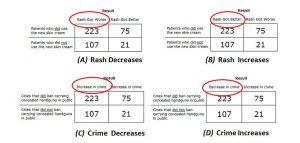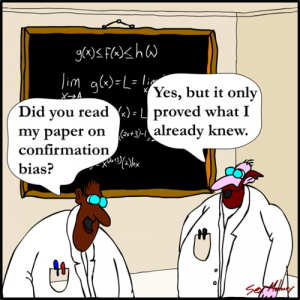Both democrats and republicans have the propensity to view the other side as unethical and immoral. Humans have the tendency to engage in confirmation bias. They do not interpret events objectively and instead favor information that they believe to be true and ignore information that doesn’t align with their beliefs. A great study that exhibits confirmation bias was conducted by researchers at Yale University (Kahan, Dawson, Peters, Slovic 2016). Researchers presented subjects with a task that would rely on their ability to produce logical conclusions from empirical data. Subjects were presented a data table about how many people’s rash got better and worst from a new skin rash treatment. The researchers then presented them the identical data except this time the data was titled cities that did or didn’t ban gun and did or didn’t experience a raise in crime. Those who scored the greatest in numeracy (the ability to draw valid conclusions from empirical data) were better at drawing valid conclusions from the table about the new skin rash treatment. However, those who scored higher in numeracy were worst at drawing valid conclusions from the information when the table was about gun control. I expected numerate participants to change their beliefs due to existing data. Yet, the scientist’s initial hypothesis was correct those who were numerate were more likely to interpret the data in a way that supported their political beliefs. When the data didn’t support their beliefs they interpreted the chart a way that supported their pre-existing ideals.

Do vaccines cause autism? Will giving children access to a comprehensive sexual education increase the teen pregnancy rate? The information is out there yet there are still disagreements on the answers to these questions. The confirmation bias states that once people develop an initial hunch they look for information that supports it and disbelieve evidence that doesn’t support it.
Preconceptions shape our interpretations of events and are usually wrong. I believe that in this case the confirmation bias could’ve been caused for many reasons. One reason is the availability heuristic. The availability heuristic states that if something pops up easily in our head we are more likely to accept it as true. Therefore, the people interpreting the information were more likely to interpret the information as false if the idea didn’t easily pop up in their head.
The inability to perceive the data accurately could also have been caused by the overconfidence phenomenon. The overconfidence phenomenon was proven in many social psychology experiments. For instance, a researcher may ask participants how many dollars a year are collected in tolls from the George Washington Bridge. When participants give an answer they are extremely confident in there answer even if they have no reason to believe they are right. So if the participants instantly saw ‘gun-ban’ and had previously came to the conclusion that gun bans make cities more dangerous they were more likely to answer the question over confidently because even if there’s data, they still think they’re right.
People may have had exhibited the over-confidence effect due to belief perseverance. People tend to believe what they initially believed even when they receive information that discredits it because they think to themselves why they’re still right. Even when they receive information that discredits their belief, they use the proof to emphasize they are right. One way to fix this would be to have people think of reasons why the opposite hypothesis may be true. Another way to resolve this would be to force the person to search for information that they don’t agree with. If they have less confidence in how right their beliefs are they may be less likely to display the over-confidence phenomenon. A second way to reduce the over-confidence phenomenon would be promptly give people information that disproves their beliefs. A significant way I could reduce confirmation bias in this situation is by explaining to people that people often are guilty of making illusory correlations and finding correlations in events that aren’t there. They may think that after their town banned guns it became less safe because there was one shootout. Yet there may be no correlation there at all.
I believe that stopping confirmation bias’ is currently of utmost importance. People cannot continue to vote for public officials who don’t believe in climate change. The future of every creature on the planet is in the hands of those who interpret empirical evidence in an unbiased way.
 Citation :
Citation :
Kahan, Dan M., et al. “Motivated Numeracy and Enlightened Self-Government.” Behavioural Public Policy, vol. 1, no. 01, 2017, pp. 1–45., doi:10.1017/bpp.2016.2.



